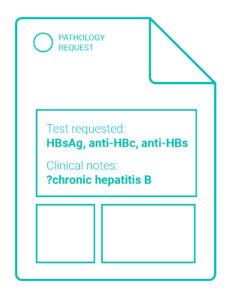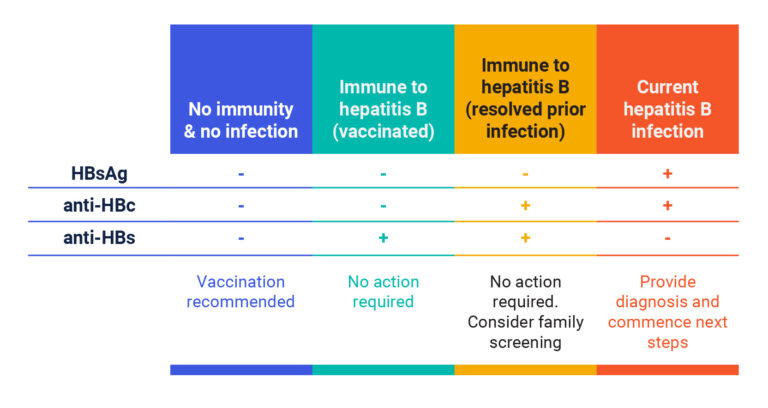“I thought I was pretty fit and healthy until I decided to donate blood and found out I had hepatitis B.” – Community member with lived experience of hepatitis B
“What started as a routine blood test ended up showing hepatitis B living within 4 of our family members without anyone knowing about it or ever hearing about such a disease.” – Community member with lived experience of hepatitis B
If there is documentation that a person is fully vaccinated they do not need to be tested again.
The indication for testing for hepatitis B among Aboriginal peoples highlights the enduring traumatic legacy of colonisation. It recognises the historical disadvantage perpetuated by institutional racism and systemic failures that collectively contribute to health disparities between Aboriginal peoples and non-Indigenous Australians.
^ EPPs are procedures where there is a risk of injury to the healthcare worker that results in exposure of the patient’s open tissues to the blood of the worker. EPPs include those where the worker’s hands (whether gloved or not) may be in contact with sharp instruments, needle tips or sharp tissues (spicules of bone or teeth) inside a patient’s open body cavity, wound or confined anatomical space where the hands or fingertips may not be completely visible at all times. Source: The Australian National Guidelines for the Management of Healthcare Workers Living with Blood Borne Viruses and Healthcare Workers who Perform Exposure Prone Procedures at Risk of Exposure to Blood Borne Viruses.
Decision Making in Hepatitis B | PDF | ASHM
National Hepatitis B Testing Policy – Indications for testing | Website | ASHM
B Positive: Hepatitis B virus testing and interpreting test results | Website | ASHM
Australian consensus recommendations for the management of hepatitis B infection | PDF | Gastroenterological Society of Australia
Australian National Guidelines for the Management of Healthcare Workers Living with Blood Borne Viruses and Healthcare Workers who Perform Exposure Prone Procedures at Risk of Exposure to Blood Borne Viruses | | PDF | Communicable Diseases Network Australia | Website | Communicable Diseases Network Australia
For information on hepatitis B epidemiology across risk groups and geographic regions and hepatitis B notifications see:
Viral Hepatitis Mapping Project National Report
| Website & PDF | WHO Collaborating Centre for Viral Hepatitis Epidemiology, The Doherty Institute & ASHM
HIV, viral hepatitis and sexually transmissible infections in Australia: Annual surveillance report 2022 | PDF | UNSW Kirby Institute
HBsAg (hep B surface antigen) = Does the person have hepatitis B?
Anti-HBc (hep B core antibody) = Has the person been exposed in the past?
Anti-HBs (hep B surface antibody) = Is the person immune?
If acute hepatitis B is suspected from history or examination, you must also order anti-HBc lgM.

Informed consent should be obtained for hepatitis B testing in a culturally appropriate and safe manner. Use a qualified interpreter if required.
Informed consent for testing means that the person agrees to be tested on the basis that they understand the testing procedures and reasons for testing, and can assess the personal implications of a positive test result, which might include further medical assessment.
In your discussion, you should include information on the reason for the test and the availability of care and treatment.
“My GP showed me my hepatitis B results and it looked so confusing! Thankfully my GP was able to explain what it all meant.” – Community member with lived experience of hepatitis B
“I was told I had hepatitis B but I still don’t understand what all the numbers mean. Googling just makes me more confused. Is there a reliable source of information or community group that can help me?” – Community member with lived experience of hepatitis B
Decision Making in Hepatitis B | PDF | ASHM
B Positive: Hepatitis B virus testing and interpreting test results | Website | ASHM
Serology results will determine if someone either:

Further information on providing a diagnosis
Further information on vaccination
Further information on isolated core positive result
Decision Making in Hepatitis B | PDF | ASHM
B Positive: Hepatitis B virus testing and interpreting test results | Website | ASHM
Hepatitis B Testing Policy: Conveying hepatitis B test results | Website | ASHM
B Positive: Hepatitis B virus testing and interpreting test results | Website | Australian Government Department of Health and Aged Care
B Positive: Hepatitis B virus testing and interpreting test results | Website | ASHM
Hepatitis B is a lifelong disease for many patients. It is important to provide support and information about the testing process to:
General information on hepatitis B | Website | Health Direct
Hepatitis B Community Forum | Online forum | Hepatitis B Community.org
Hepatitis B Voices Australia | Website
A guide to hepatitis B | PDF | Hepatitis Australia
Hepatitis B testing for adults | Website | Hepatitis Queensland
Hepatitis B: It’s family business (multiple languages available) | Website | Multicultural HIV and Hepatitis Service
This plain English resource is designed to support health workers discussing chronic hepatitis B with patients, including refugee and migrant communities: The Hepatitis B Story (multiple languages available) | Website & PDF | St Vincent’s Hospital Melbourne
Hepatitis B & C (available in Chinese) | Website | Australian Government Department of Health and Aged Care
ASHM Head Office - Sydney
Level 3, 160 Clarence Street Sydney, NSW 2000
Tel: (+61) 02 8204 0700
ASHM acknowledges the Traditional Owners of Country across the various lands on which we live and work. We recognise Aboriginal and Torres Strait Islander peoples’ continuing connection to land, water, and community and we pay our respects to Elders past and present. ASHM acknowledges Sovereignty in this country has never been ceded. It always was, and always will be, Aboriginal land.
The information provided on this website and its related websites and guidelines, and the resources made available by ASHM in any format or medium, are for general information purposes only and are not intended as medical advice or as a substitute for consultation with a qualified healthcare professional. While ASHM Health strives to provide accurate and current resources and information, the resources, information and guidelines made available by ASHM Health do not provide personalised medical advice, diagnosis, or treatment. Healthcare professionals should apply their clinical judgment and consider individual circumstances when using this information. To the extent permitted by law, ASHM Health disclaims all liability for any outcomes resulting from reliance on the information provided. For specific medical concerns, please consult a licensed healthcare provider.
ASHM Health | ABN 48 264 545 457 | CFN 17788 | Copyright © 2024 ASHM